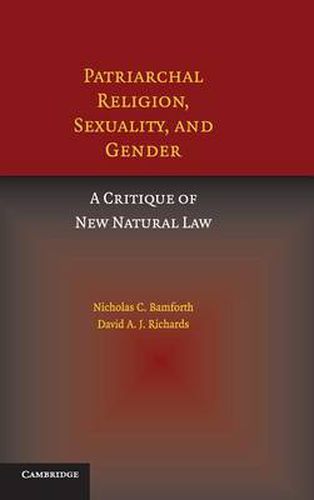Readings Newsletter
Become a Readings Member to make your shopping experience even easier.
Sign in or sign up for free!
You’re not far away from qualifying for FREE standard shipping within Australia
You’ve qualified for FREE standard shipping within Australia
The cart is loading…






Legal theorists are familiar with John Finnis’s book Natural Law and Natural Rights, but usually overlook his interventions in US constitutional debates and his membership of a group of conservative Catholic thinkers, the ‘new natural lawyers’, led by theologian Germain Grisez. In fact, Finnis has repeatedly advocated conservative positions concerning lesbian and gay rights, contraception and abortion, and his substantive moral theory (as he himself acknowledges) derives from Grisez. Bamforth and Richards provide a detailed explanation of the work of the new natural lawyers within and outside the Catholic Church - the first truly comprehensive explanation available to legal theorists - and criticize Grisez’s and Finnis’s arguments concerning sexuality and gender. New natural law is, they argue, a theology rather than a secular theory, and one which is unappealing in a modern constitutional democracy. This book will be of interest to legal and political theorists, ethicists, theologians and scholars of religious history.
$9.00 standard shipping within Australia
FREE standard shipping within Australia for orders over $100.00
Express & International shipping calculated at checkout
Legal theorists are familiar with John Finnis’s book Natural Law and Natural Rights, but usually overlook his interventions in US constitutional debates and his membership of a group of conservative Catholic thinkers, the ‘new natural lawyers’, led by theologian Germain Grisez. In fact, Finnis has repeatedly advocated conservative positions concerning lesbian and gay rights, contraception and abortion, and his substantive moral theory (as he himself acknowledges) derives from Grisez. Bamforth and Richards provide a detailed explanation of the work of the new natural lawyers within and outside the Catholic Church - the first truly comprehensive explanation available to legal theorists - and criticize Grisez’s and Finnis’s arguments concerning sexuality and gender. New natural law is, they argue, a theology rather than a secular theory, and one which is unappealing in a modern constitutional democracy. This book will be of interest to legal and political theorists, ethicists, theologians and scholars of religious history.